German humanitarian assistance helps to serve 7 million drought-affected people across Somalia
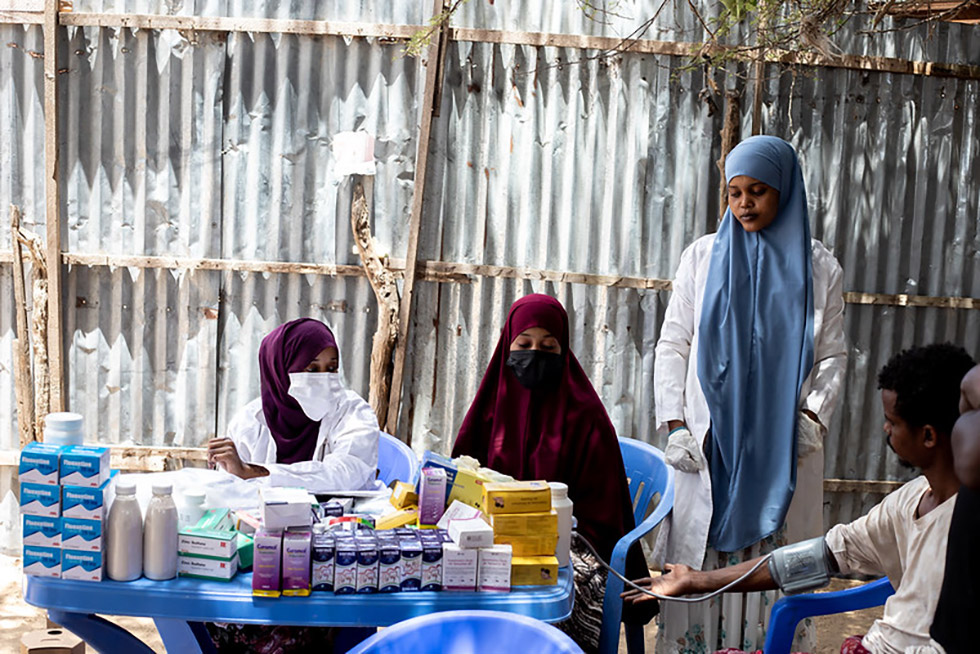 German funding has helped WHO Somalia support ministries of health to extend outreach sessions to more than 5 million people across 74 drought-affected areas in Somalia. Photo credit: WHO/I. Taxta4 December 2023, Mogadishu, Somalia – Over 7 million people in Somalia have gained access to improved health and nutrition services since November 2022, thanks to a collaborative effort between the World Health Organization (WHO) and the Government of Germany.
German funding has helped WHO Somalia support ministries of health to extend outreach sessions to more than 5 million people across 74 drought-affected areas in Somalia. Photo credit: WHO/I. Taxta4 December 2023, Mogadishu, Somalia – Over 7 million people in Somalia have gained access to improved health and nutrition services since November 2022, thanks to a collaborative effort between the World Health Organization (WHO) and the Government of Germany.
The German funding has enabled WHO to support the federal and state ministries of health to reach 65–70% of people living in the country’s 74 drought-affected districts, through 281 health facilities. This support has also helped WHO Somalia to strengthen community- and facility-based disease surveillance systems by deploying 2195 vaccinators and community health workers (CHWs).
“From identification of suspected cases, contact tracing, laboratory confirmation and treatment of patients throughout the global COVID-19 pandemic to managing the unprecedented drought and resultant cholera and measles outbreaks in the country, this German-supported introduction of community-based surveillance by WHO Somalia has helped save thousands of lives,” said Dr Fahim, Director of Immunization at the Federal Ministry of Health.
“The network of CHWs not only helped report disease outbreaks and instigate investigations but also collected data, which helped senior managers at the Ministry of Health and WHO to develop disease patterns and, ultimately, plan the targeted and timely integrated health and nutrition response to ongoing health emergencies across the country,” Dr Fahim added.
Using the German humanitarian assistance, WHO has achieved the following:
2195 vaccinators and community health workers deployed: These dedicated individuals have played a crucial role in disease surveillance, data collection, and outbreak response.
5,858,804 cases of communicable and noncommunicable diseases treated: Through integrated outreach sessions, health workers have provided essential care to millions of people.
1,495,284 people vaccinated against cholera: This targeted campaign has helped to prevent the spread of this deadly disease.
2,931,733 children vaccinated against measles: Protecting children from this highly contagious virus is a vital part of ensuring their health and well-being.
85 tons of medical supplies distributed: This critical support has helped health facilities in drought-affected districts to provide essential care to patients in need. Some 101 pediatric nutrition kits provided to treat severe acute malnutrition.
99% of the 33,567 children aged under 5 years identified with severe acute malnutrition were cured.
Dr. Sindani Ireneaus Sebit, WHO Representative a.i. to Somalia expressed gratitude for the German support: "This timely assistance has helped avert a major health crisis and saved countless lives. We are grateful to the Government of Germany for its unwavering commitment to the people of Somalia."
“The country’s fragile health system and the continued impact of climatic shocks continue to test the resolve and resilience of health partners and populations alike. The cost of our inaction will mean that children, women and other vulnerable people will pay with their lives while we hopelessly, helplessly witness the tragedy unfold,” added Dr Sindani. “As we have seen during our collective emergency response operations for COVID-19, early action and the delivery of high quality and evidence-based interventions can protect health and well-being, even if the health system is fragile.”
Background
Decades of conflict, frequent epidemics of cholera and measles, widespread poverty, and recurrent climatic shocks, including the ongoing drought emergency, continue to weaken Somalia’s health systems. The acute malnutrition burden in Somalia is expected to reach about 1.5 million children in 2024, including 331 000 children likely to suffer severe acute malnutrition.
Increased incidences of waterborne diseases, especially cholera and acute diarrhoea, are seen among drought-affected populations. The country is experiencing multiple disease outbreaks, including measles, cholera and dengue fever, and heavy seasonal rains made worse by El Niño, resulting in increased morbidity and mortality.
From January to November 2023, 16 036 cholera cases, including 43 deaths, were reported. While the epidemiological trends have been stabilizing, about 400–600 cholera cases on average continue to be reported each week. This situation is expected to worsen due to floods and other impacts of El Niño.
For more information, please contact:
Fouzia Bano, Communications Officer, WHO Somalia
Email:
Saeed Ahmed, Reporting Officer, WHO Somalia
Email:
Related links
Cholera cases on the rise in Somalia amid rising displacement of people
From desperation to triumph: saving the lives of children with severely acute malnutrition in fragile settings
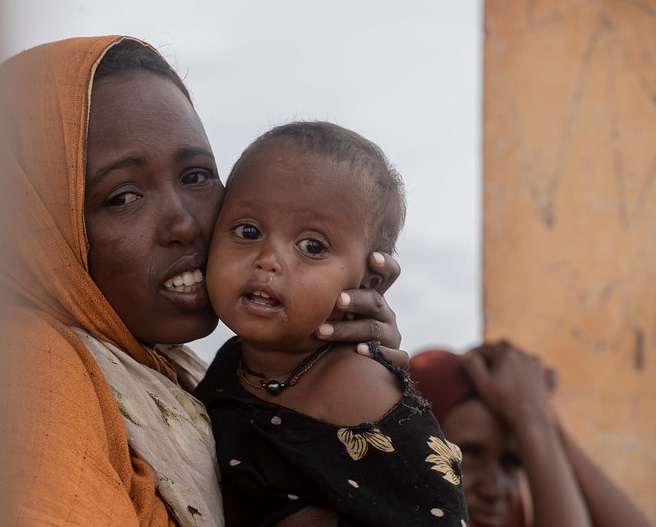 WHO Somalia with the support of UN-CERF is providing hope and life-saving treatment to malnourished children by sustaining stabilization centres across Somalia. Photo credit: WHO Somalia/I.Taxta15 November 2023, Mogadishu, Somalia – Malnutrition affects communities far and wide, weaving its way through many lives, often with devastating results. The problem is painfully evident in Somalia, a nation grappling with recurrent droughts, conflicts, and disease outbreaks, primarily in its southern regions. These emergencies have worsened malnutrition, which was already at dire levels, leading to an alarming rise in disease, death, disability, and prolonged suffering, especially among children under five years of age.
WHO Somalia with the support of UN-CERF is providing hope and life-saving treatment to malnourished children by sustaining stabilization centres across Somalia. Photo credit: WHO Somalia/I.Taxta15 November 2023, Mogadishu, Somalia – Malnutrition affects communities far and wide, weaving its way through many lives, often with devastating results. The problem is painfully evident in Somalia, a nation grappling with recurrent droughts, conflicts, and disease outbreaks, primarily in its southern regions. These emergencies have worsened malnutrition, which was already at dire levels, leading to an alarming rise in disease, death, disability, and prolonged suffering, especially among children under five years of age.
Meet Maryama1, a mother of 9 children, whose life took a devastating turn when she lost her livestock to the relentless drought. She was left to feed for her family alone, without support from her extended family. Like many others, she was unable to find enough food for her family and would often make all of them sleep hungry. Maryama’s story took a pivotal turn on 4 July 2023, when she walked into a WHO-supported Mother and Child Hospital in Heliwa district to seek help for her three-and-a-half-year-old daughter, Amina.
At the hospital’s stabilization centre – a ward supported with essential lifesaving medical supplies by WHO with the support from the United Nations Central Emergency Response Fund (CERF) to treat children suffering with severe acute malnutrition with medical complications – the paediatric doctors, nurses and nutritionists promptly assessed Amina’s health and nutritional status. Amina was diagnosed with severe acute malnutrition, compounded by a range of medical complications. Due to her frail frame, lack of appetite and skin lesions, doctors recommended immediate hospitalization of Amina.
As Maryama had to remain with her daughter, she initially hesitated to accept it, given her role as the family’s sole breadwinner. It was only after the counselling from the highly skilled nutrition staff and doctors who gently guided Maryama toward making the decision to admit her child for life-saving treatment.
Life-saving treatment and care
Amina received essential medications as well as therapeutic milk to stabilize and rebuild her tissues. Slowly but surely, Amina’s conditions improved. Within two weeks of her admission and continued medical treatment, she started feeding without the aid of a tube, hence she was put on a ready-to-use therapeutic food to treat her malnutrition.
Expressing gratitude Maryama said: “I thank from the depth of my heart the doctors, nurses and the staff in this hospital as well as to the WHO and the donors who made this health facility functional, because without this, I would have certainly lost my daughter. Along with the treatment of my daughter, we have been provided with 3 meals a day, food packages, a warm blanket and cleaning supplies.”
“This remarkable transformation in Amina’s health and well-being was made possible thanks to support and funding provided by the United Nations Central Emergency Response Fund (CERF). The CERF assistance enables the Mother and Child Hospital to provide life-saving treatment and care to children like Amina, ensuring they have access to medical support and a chance at a better future,” said Dr Mahmud, the medical officer at the hospital. Adding he said that this hospital, thanks to the support from WHO and donors, has resumed functioning and providing life-saving services to not only locals but to the displaced people from nearby villages and districts.”
A Nurse, while treating other patients at this stabilization centre informed that “When Amina arrived at the hospital, her weight was shockingly low – far below the healthy range for a child of her age. With consistent medical care and daily nutritious feedings, Amina was discharged from the stabilization centre and transferred to an outpatient therapeutic programme at the same hospital.”
In the weeks that followed, Amina continued her journey towards full recovery as Maryama continued to bring her to the hospital for continued medical treatment. Such was the impact of Amina’s recovery that her neighbours gave her a new name, Xabaal Diid—meaning triumph over illness.
In a world often overshadowed by adversity, stories like Amina and Maryama’s remind us that hope, resilience and support can lead to brighter tomorrows. Thanks to the generosity of CERF and other donors, countless lives are being transformed and the cycle of malnutrition is being broken, one child at a time.
For additional information, please contact:
Fouzia Bano, Communications Officer,
Saeed Ahmed, Reporting Officer,
Related links
1 For security reasons names of the drought-survivors and medical officers have been changed in this story
FIND supports WHO to deploy community health workers who are reaching out to marginalized and often excluded settings with essential health care and saving lives in Somalia
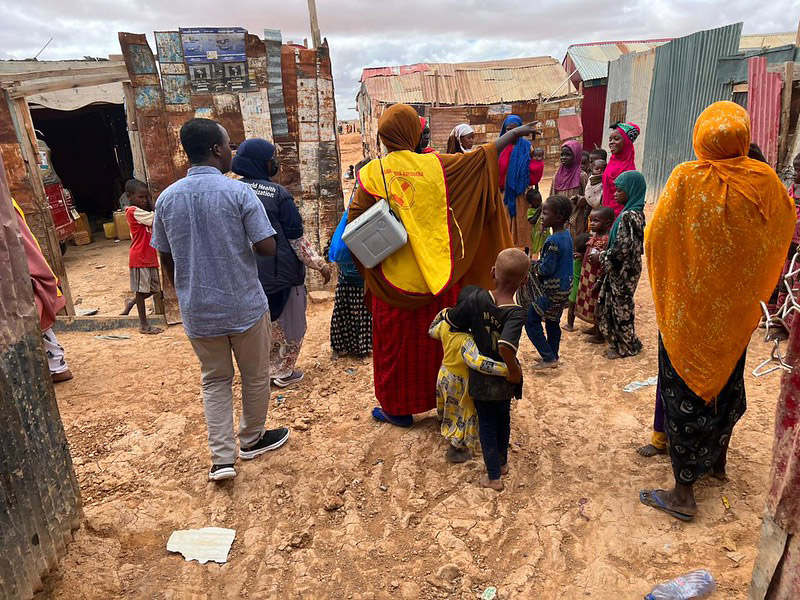 Sarbina Ali, a community health worker visits on average 50 households in the IDP camp to raise awareness about the importance of hygiene and refer patients to available health services including immunization. Photo credit: WHO Somalia/I. Taxta
Sarbina Ali, a community health worker visits on average 50 households in the IDP camp to raise awareness about the importance of hygiene and refer patients to available health services including immunization. Photo credit: WHO Somalia/I. Taxta
22 November 2023, Mogadishu, Somalia – Amid the severe drought crisis in Somalia, Sarbina Ali, a community health worker is bringing hope to internally displaced people seeking refuge in the Daynile district. With the support of WHO and its drought response team, Ali works tirelessly to provide community-level health services and mobilize the affected community to practise healthy living.
Daynile, in the north of the Banadir region, has become a haven for internally displaced people due to its ease of access from Afgoye and Balcad, where conflict and drought have displaced many people. Ali, a mother of 7 children, was selected by Banadir Health Directorate as a community health worker for the WHO-supported drought response. Her familiarity with the area and unwavering commitment to the community made her an ideal candidate for the role.
The WHO country office in Somalia, with funding support from the Foundation for Innovative New Diagnostics (FIND), has deployed community health workers in some of the worst drought-affected districts as part of implementing community-based surveillance. Majority of these community health workers are women, and they belong to the same community where they are deployed. This project aims to help improve the collection and use of timely and accurate health and nutrition data through the community health workers who are providing basic health care in marginalized settings where people have no access to health care either due to geographic accessibility or insecurity. In addition, these community health workers are monitoring health-related events and community alerts for further verification by the rapid field investigation teams. This way, any public health threat before it turns into an epidemic in the community, is identified timely and rapidly contained.
“As someone who has lived here for a long time, I feel a responsibility to welcome and assist the new arrivals and those who are already residing in this camp,” says Ali. “They are our guests, seeking refuge from hunger and violence. I do my best to identify sick and suffering ones arriving at the camp, refer them to WHO-supported health services including immunization, guide them about the schedule of the outreach teams and educate them about healthy living. It brings me joy to serve these people, knowing that they have lost most of their belongings including livestock and been severely affected by the drought.”
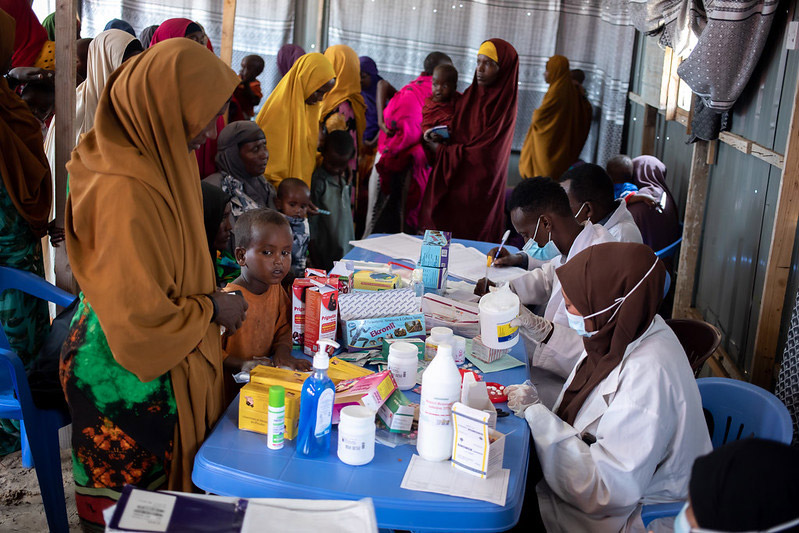 A WHO-supported outreach team offers registration, treatment, and medication for the ailments to displaced persons living at the IDP camp in Daynile district. Photo credit: I. Taxta
A WHO-supported outreach team offers registration, treatment, and medication for the ailments to displaced persons living at the IDP camp in Daynile district. Photo credit: I. Taxta
Ali’s role as a community health worker involves raising awareness among the displaced community about malnutrition, sanitation, hygiene and diseases like acute watery diarrhoea, measles, and COVID-19. Talking about her key challenges, she said that during her door-to-door community mobilization efforts displaced residents often prioritize food over medicine. “I have to consistently remind and educate them both individually and collectively that their living conditions in the camp exposes them to extreme circumstances, therefore, they need to give equal priority, if not more, to their health and hygiene.”
Every day, Ali visits a minimum of 50 households, ensuring that women and children in the camp are familiar with her friendly face. She serves as a vital link between the community and the outreach teams supported by WHO for the drought response. Ali’s dedication and tireless efforts have significantly improved the lives of those he serves.
One particularly heartbreaking incident stands out in Ali’s memory. During a visit to the camp, he came across a woman who was 9 months pregnant and was suffering from malnutrition and other medical conditions, some of which were related to displacement, lack of hygiene and poor living conditions. Upon identifying her, Ali immediately brought her to the WHO-supported outreach team in the camp, to get the life-saving medical attention and treatment. The woman eventually gave birth to a healthy baby girl at the district hospital.
Seeking anonymity due to security reasons, Fartun she said that “Ali was a God-sent help to me when I reached this camp after fleeing from a life-threatening experience from my village—about 150 kilometres from this camp—and I am so grateful to WHO for arranging these services for people like me,” observed Fartun while narrating her experiences. Staunchly dedicated to her work, Ali considers it both a voluntary and moral obligation to serve vulnerable people who have fled drought and war.
Mahmud Hairan, the medical officer at the district hospital observed that “Community based surveillance has helped with timely identification of the sick children and women within the IDP camps and eventually has helped save many precious lives.”
For more information, please contact:
Fouzia Bano, WHO Communications Officer
Email:
Saeed Ahmed, WHO Reporting/EXR Officer
Email:
View the links below for more information:
Drought survivors converge on internally displaced person camps to “live another day”
WHO Representative explains drought situation and response in Somalia (video on Flickr)
[1] Name of the beneficiary changed due to security reasons
KSrelief supporting community dialogues to promote lifesaving practices
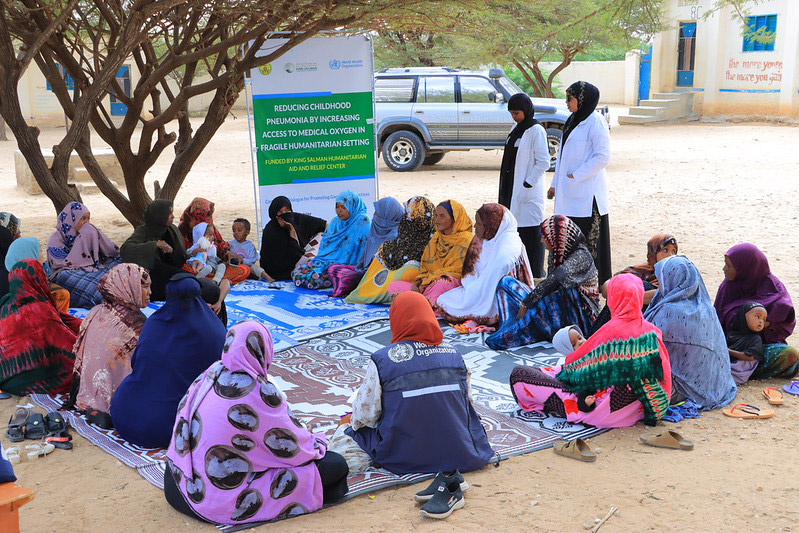 Engaging communities in meaningful dialogue through the KSrelief-funded project will help combat the high prevalence of childhood pneumonia and encourage safe caregiver practices in Somaliland. Photo credit: WHO Somalia/S.Farah
Engaging communities in meaningful dialogue through the KSrelief-funded project will help combat the high prevalence of childhood pneumonia and encourage safe caregiver practices in Somaliland. Photo credit: WHO Somalia/S.Farah
13 November 2023, Arabsiyo, Somalia – Hawa, a resilient mother of 5 young children, has experienced the challenges and joys of motherhood in Somaliland (1). Her journey took a heartbreaking turn when her new baby had a low birth weight and later died of pneumonia, a prevalent and deadly illness in Somalia.
About 12.8% of newborns in Somalia are born with low birth weight, and pneumonia is a leading cause of death for children aged under 5 years, accounting for 21% of all deaths in this age group – or 39.5 deaths per 1000 live births (2). Shockingly, only 13% of children with pneumonia symptoms receive treatment in health facilities, and less than 1% receive antibiotics either in the community or at health facilities (3). Hawa’s story, which is all too common in Somalia, highlights the urgent need to address childhood pneumonia and diseases in the country.
“Every breath counts: reducing childhood pneumonia through enhanced medical oxygen access in Somalia” is a project to combat the high prevalence of childhood pneumonia and encourage safe caregiver practices to improve child health outcomes.
The project aims to reduce under-five morbidity and mortality by 40%, by providing medical oxygen and pneumonia and diarrhoea treatments, and educating communities on safe hygiene practices, breastfeeding, and pneumonia symptoms through community dialogues. This 18-month project spans 10 districts across Somalia, including Somaliland, and is funded by the King Salman Humanitarian Aid and Relief Centre (KSrelief) of the Kingdom of Saudi Arabia.
First community dialogue makes an impression
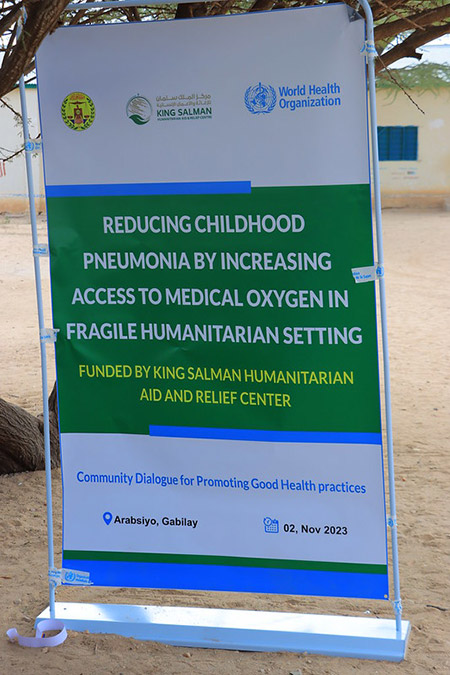 Despite Hawa’s heartbreaking experience, she made the brave decision to take part in the first community dialogue of the KSrelief-funded project. The Ministry of Health and Development of Somaliland organized the discussion with the support of the WHO Country Office
Despite Hawa’s heartbreaking experience, she made the brave decision to take part in the first community dialogue of the KSrelief-funded project. The Ministry of Health and Development of Somaliland organized the discussion with the support of the WHO Country Office
Kangaroo mother care (KMC) was the topic of this community dialogue, which took place on 2 November 2023 in Arabsiyo, Gabilay district, Somaliland, with 27 community members. KMC is a life-saving practice that involves skin-to-skin contact between a mother and her preterm or low-birth-weight newborn.
KMC was defined and its benefits for vulnerable newborns were set out. Participants discussed potential barriers, misconceptions and cultural beliefs regarding KMC, as well as the role of fathers and the community in supporting mothers who practise KMC. In Somali culture, it is customary to carry babies on the back. But the participants agreed that KMC could become part of their culture through more community dialogue to promote the practice.
Hawa shared her thoughts on the community dialogue: “In our traditional way of carrying babies, we always believed that the mother who carries her baby on her chest and moves around with them is incompetent and putting her child in danger. However, learning today that KMC is critical for low-birth-weight children and can save their lives is very useful information.”
She added, “I couldn’t save my youngest child, but I believe that by participating in these dialogues, I can help save other children. It is essential to spread awareness about practices like KMC, and together, we can make a difference.”
Umalkayr, the facilitator for this discussion, believes that community dialogues play a crucial role in bringing about behavioural change by addressing various myths and promoting knowledge about life-saving and healthy practices among all community members, especially mothers and community elders.
“By openly discussing topics such as KMC and safe caregiver behaviours,” said Umalkayr, “local communities have shown the willingness to adapt and improve their knowledge and practices, which will eventually help save many more children.”
For more information, please contact:
Fouzia Bano, Communications Officer
Email:
Saeed Ahmed, Reporting Officer
Email:
Note to editors:
For more details about the project in Somalia, see: “Every breath counts”: KSrelief and WHO join hands to prevent childhood deaths by increasing access to medical oxygen in Somalia
[1]. Name changed to protect identity.
[2]. A good start in life begins in the womb.
United Nations Children’s Fund; July 2023.
[3]. Country Cooperation Strategy for WHO and Somalia 2021–2025.
Cairo: WHO Regional Office for the Eastern Mediterranean; 2022.


